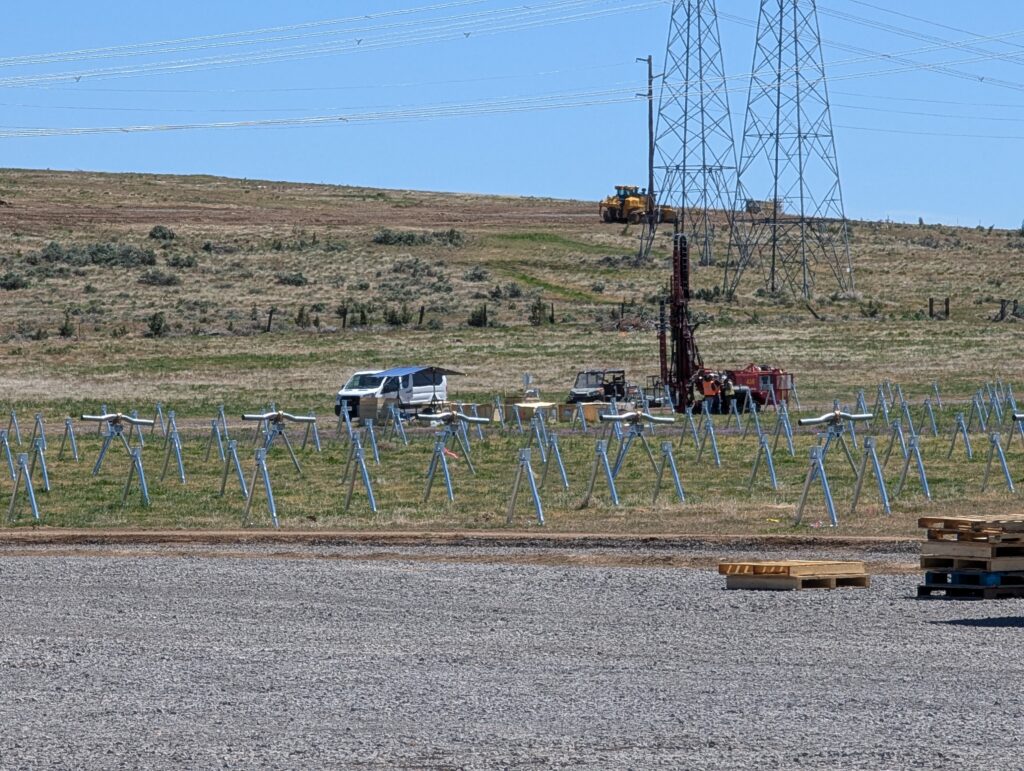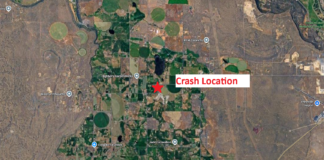
UPDATE: Shortly after initial publication, the hearing was started as scheduled, but County Commissioners unanimously voted to postpone the hearing to July 1st at 1 pm.
Prineville, Ore. – The Prineville Review filed a formal grievance Wednesday morning against the Crook County Board of Commissioners, alleging the county failed to provide timely and specific notice of a public hearing concerning a controversial expansion of the TSR North Solar Facility near Powell Butte. The Prineville Review learned of the hearing—scheduled for June 18—only the day prior, with no formal notice having been provided directly to the publication despite its prior requests and ongoing coverage of the project.
The grievance asserts the county violated Oregon’s Public Meetings Law by not issuing required notice under ORS 192.640 and failing to meet even the 48-hour minimum notice standard set by OAR 199-050-0040(2) in making that notice. It also highlights that the initial public hearing on the matter, held May 29, similarly proceeded without any notice to the Prineville Review which frequently continues its local government reporting.
The proposed expansion—addressed in Ordinance 351—would grant a Statewide Planning Goal 3 exception to allow the solar facility to grow from 320 acres to approximately 585 acres of rural Crook County land near Powell Butte.
County Response and Prompt Filing
After raising the issue during Wednesday morning’s Board of Commissioners meeting, the Prineville Review received a brief email from the County.
“Just so you’re aware, today’s land use hearing has been noticed on our website since May 8 and a newspaper notice was published May 13,” said Community Development Manager John Eisler.
In a reply to Eisler, the Prineville Review noted that this may satisfy land use hearing notice requirements, but not the broader obligations under Oregon’s Public Meetings Law:
“We were not provided specific notice as required under ORS 192.640. The Prineville Review is a newspaper, and we have requested specific notice which was not made. While your notice may comply with the additional requirements for a public hearing, it must also comply with public meetings law notices as well.”
Eisler and the County have not responded further as of the time of publication.
The response also included this publication’s formal public meetings grievance as provided under ORS 192.705.
“This matter involves a solar project—projects which have generated significant criticism and objections from local citizens,” the grievance states. “Considering a key local news source was not even made aware, it likely prevented any meaningful reporting and notice to the citizens of Crook County on this matter which does not align with the transparency goals of the public meetings law.”
A public meetings grievance is a newer process that enables any individual, including members of the news media, to raise issues with public meetings violations. The grievance can then be escalated to a formal complaint that is investigated by the Oregon Government Ethics Commission (OGEC) against individual members of a governing body.
Violations of Oregon public meetings traditionally required costly and often prohibitive lawsuits to hold public officials accountable on complying with Oregon’s public meetings laws. Increasing issues with public meetings compliance across the state in recent years prompted the Oregon Legislature to pass SB 2805 in 2023, which significantly revised the state’s Public Meetings Law.
The bill also broadened the definition of a “meeting,” clarified procedures and notice requirements, and enhanced investigative oversight by the OGEC. It also introduced mandatory training for members of certain governing bodies, which included the Crook County Board of Commissioners.
All three commissioners attended an in-person OGEC public meetings training earlier this year, following its own admitted violations of public meetings notice violations in response to an earlier grievance from the Prineville Review. That grievance focused on the commissioners waiting until a day before their meetings to release an agenda when Oregon law and guidance from the DOJ outline it should be released about a week prior, with an additional administrative rule making clear no meeting notice may be less than 48 hours for regular meetings.
Project Background and Public Concerns
The TSR North Solar Facility is a large-scale photovoltaic installation west of Powell Butte, originally approved in 2019 for a 320-acre footprint. A 2020 modification expanded the project to 585 acres, triggering the need for a formal Goal 3 exception due to the site’s designation as non-arable farmland.
The project is being developed by New Sun, a Bend-based energy firm founded by Jake Stephens. According to reporting from the Redmond Spokesman, once complete, it will generate up to 60 megawatts of power, with the initial 40 MW under contract with Seattle City Light. The site will include solar panels, energy storage systems, a substation, and associated infrastructure.
Community concerns over the facility have persisted since its initial approval, with previous objections raised regarding reflectivity, scenic impacts, and compatibility with rural land use.
Next Steps
The Prineville Review continues to investigate the handling of public notice procedures and intends to follow up as additional responses or developments occur.
Shortly after initial publication, the County Commissioners voted at the start of the hearing to postpone it until July 1st, while Eisler told the Commissioners that they did not believe the failure to provide notice to the Prineville Review constituted a violation of the law. Commissioners Barney and Hermreck refused to provide any comment, which has been their standard position on all inquiries from this publication.
Commissioner Crawford did take some questions regarding public meeting issues generally, while also confirming that, after learning we were not provided notice, he was prepared to push for postponing the meeting and was not prepared to participate had the other commissioners moved forward. We will have more of Crawford’s remarks in an upcoming story.
Note: This story was updated shortly after publication to include details from the postponed meeting and reference to remarks made by Commissioner Crawford.
Mr. Alderman is an investigative journalist specializing in government transparency, non-profit accountability, consumer protection, and is a subject matter expert on Oregon’s public records and meetings laws. As a former U.S. Army Military Police Officer, he brings a disciplined investigative approach to his reporting that has frequently exposed ethics violations, financial mismanagement, and transparency failures by public officials and agencies.





